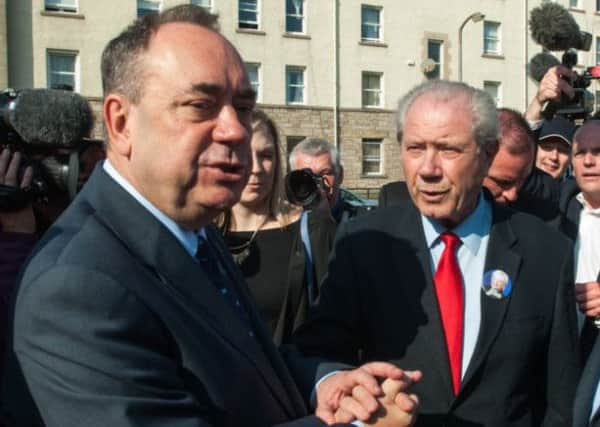Jim Sillars accuses SNP of '˜soft-selling' independence


Jim Sillars, deputy leader of the SNP in the early 90s and a continuing party member, pledged to vote for rival nationalist party Rise on the regional list that provided a route for his late wife Margo MacDonald to return to Holyrood as an independent MSP three times following her expulsion from the SNP.
Speaking at at a conference for the Rise-affiliated Radical Independence Campaign (RIC) in Edinburgh, Mr Sillars urged nationalists to learn the lesson from final six months before the 2014 referendum, when a concerted effort pushed support for independence from 29 per cent in the polls to 45 per cent in the referendum.
Advertisement
Hide AdAdvertisement
Hide AdCat Boyd, co-founder of RIC and Rise candidate for Glasgow, described the mainstream Yes Scotland campaign - an SNP, Scottish Greens, Scottish Socialist Party and civic alliance - as a centrist campaign “started by centrist parties orientated around businesses, middle-class professionalism and established opinion”.
She told how she has been “trolled” relentlessly by other nationalists who called RIC an MI5 and Labour Party front.
Mr Sillars said: “There is a reason why it was at 29 per cent in February 2014.
“From 1992 until 2014 the SNP never unambiguously campaigned to build support for an independence vote.
“They soft-sold people, in the sense that when Westminster elections came along they called for ‘a stronger voice for Scotland at Westminster’.
“When John Swinney was leader he said, ‘you don’t need to support independence to vote for us’.”
Current leader Nicola Sturgeon has made similar appeals to unionists to back the SNP - but has pledged to continue to build support for independence over the next few years “in a realistic and relevant way”.
Mr Sillars said: “If you don’t campaign for independence you don’t build an independence vote and you don’t get independence.
Advertisement
Hide AdAdvertisement
Hide Ad“After the next election the Yes movement has to get itself back together again, and it has to sustain a campaign from now on until the day we get independence.
“We’re not at 29 per cent now - we’re at 45% and it’s much easier to go from that platform to the level we need.
“One of the reasons I am voting for Rise on the second list ballot is that they are unambiguously saying to people: ‘If you vote for us make no mistake about it - you are, in actual fact, voting for independence.’
“I hope that after the election the Yes campaign can get itself together again, this time not dominated by one party but this time broadly based and right across the board.”
Ms Boyd said she go “a lot of stick” from some “furious” nationalists when she co-founded RIC four years ago.
She said: “Some of them called us an MI5 front, some called us a Labour Party front, and then you had the old left who said we were capitulating to nationalism and spread the word that we were funded by people like Brian Souter.
“But the existing campaigns for Yes that were already out there were too narrow to tell the story of Scotland that we wanted to tell.
“They were centrist campaigns started by centrist parties orientated around businesses, middle-class professionalism and established opinion.”
Advertisement
Hide AdAdvertisement
Hide AdShe praised former SNP MSPs John Finnie and Jean Urquhart for resigning from the SNP over the party’s U-turn over supporting military alliance Nato.
Mr Finnie has since joined the Scottish Greens who were also taking part in the RIC conference, with co-convener Maggie Chapman addressing delegates and participating in workshops.